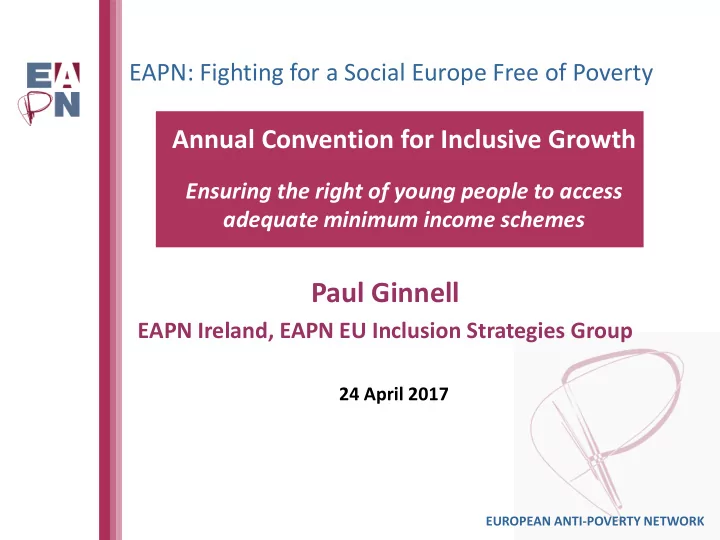

EAPN: Fighting for a Social Europe Free of Poverty Annual Convention for Inclusive Growth Ensuring the right of young people to access adequate minimum income schemes Paul Ginnell EAPN Ireland, EAPN EU Inclusion Strategies Group 24 April 2017 EUROPEAN ANTI-POVERTY NETWORK
What is the European Anti-Poverty Network (EAPN)? Independent network of NGOs committed to fight against poverty and social exclusion, with people in poverty. Started in 1990 – key actor in poverty programmes and development of the Social Open Method of Coordination. Receives financial support from the European Commission (EaSi) 31 National Networks and 14 European NGOs as members (10000+ organisations) Participation of people with direct experience of poverty must be part of the solution. Eradicating poverty is feasible and a political choice.
What are Minimum Income schemes? Last resort schemes for people of working age; p roviding a means-tested safety net for those not eligible for social insurance payments or those whose entitlement to these payments has expired; intended to prevent destitution and to ensure a decent minimum standard of living . Particularly important for young people who have not yet had a first job, and are ineligible for unemployment benefits . EU (and stakeholder) reference framework Council Recommendation (1992) Active Inclusion Strategy (2008), Social Investment Package (2013) EP Reports and Resolution on Active Inclusion and Minimum Income (2008 and 2010) Commission project & peer review on reference budgets European Pillar of Social Rights proposed outline (2016) Social Platform endorsement (2014); ETUC Resolution supporting an EU minimum income (2016);
EAPN work on Minimum Income Key concern since the 1990s – adequate minimum income schemes are a cornerstone of dignified lives EAPN IE and AT led projects on social standards and budgets (2007, 2009) Campaign for adequate minimum income schemes in 2007- 2009 Major conference in 2010 (European Year against Poverty); legal study and proposal for a framework Directive Key lobbying element – Europe 2020 and European semester processes, EP / CoR / EESC reports, 2014 EP elections campaign. European Minimum Income (EMIN) project: Informal network of organisations and individuals committed to achieve the progressive realisation of adequate, accessible and enabling Minimum Income scheme s Present in all Member States + IC, NO, MK, SR Started as a two-year project ( EMIN 1, 2013-2014 ), continued in 2017-2018 (EMIN 2) , supported by funding from the European Commission
EMIN findings: age as a restrictive factor in accessing minimum income schemes (2015) Just under half of countries have no age limit for receiving minimum income; in the other countries, these limits range from 18+ to 28+ Countries featuring no age limit: AT, BG, CZ, DE, DK, EE, FI, HR, IE, LV, MK, NO, RS, SI 18+: BE (except heads of family), GR (if not married, still in education, or in military service), IT (some regional conditionality), LT (if not high school students or having own family), NL (some restrictions), PL, RO (some restrictions), UK 21+ : SE (under 21s are considered dependents in their parents’ household) 23+: MT (young people aged 18-23 must apply for the Youth Guarantee instead) 25+: ES, FR, LU (unless having dependents or a work incapacity), SK (unless living with parents and attending school) 28+ : CY (except married, single parent, orphans, with disability) Equally, in some countries, young people receive a lower level of income , based on their age (UK, IE and DK, for instance)
EMIN findings: interplay with activation policies for young people / conditionality Access to adequate minimum income schemes is one of three mutually reinforcing pillars of the Active Inclusion strategy (2008), the other two being inclusive labour markets and universal access to affordable, quality services. However, while in nearly half of the countries studied, there is a clear tendency to increase the emphasis on developing active labour market policies (ALMP) for people on minimum income schemes, rare mentions are made of services or personalized approaches as part of the package. Most countries have very strict conditions for minimum income recipients , including compulsory participation in public works (e.g. BG, DK, HR, HU, IT – some regions, LT, RO). Evidence shows that young people , in addition to age-related eligibility criteria, and lower level of benefits, are sometimes also submitted to stricter labour market – related conditionality in order to access minimum income schemes
Way Forward – Key Messages The right to adequate resources is a fundamental human right and needs to be effectively guaranteed to all! Implement real, integrated Active Inclusion – including access to quality, supportive services, and personalized approaches Mainstream and prioritise the improvement of the adequacy and effectiveness of minimum income schemes in all European Semester processes, given their key role in contributing towards the poverty reduction target of the Europe 2020 Strategy. Tackle growing inequality through social investment in welfare states and fair distribution: including living wages, adequate social protection, public services, progressive taxation and combating tax fraud. Better align Youth Guarantee and adequate income support mechanisms , such as minimum income schemes, to ensure adequate resources and poverty-free lives for youth Invest in concrete actions to guarantee EU social standards beyond employment – propose an EU framework Directive on minimum income, a Golden Rule benchmarking adequate levels of social protection spending, and an EU framework for minimum wages.
Thank you for your attention! For more information: www.eapn.eu https://emin-eu.net/ Paul Ginnell paul@eapn.eu EUROPEAN ANTI-POVERTY NETWORK RÉSEAU EUROPÉEN DE LUTTE CONTRE LA PAUVRETÉ ET L’EXCLUSION SOCIALE BOULEVARD BISCHOFFSHEIM, 11 – 1000 BRUSSELS TEL: 0032 2 226 58 50 www.eapn.eu - team@eapn.eu Follow us on Facebook, LinkedIn and Twitter @EAPNEurope
Recommend
More recommend